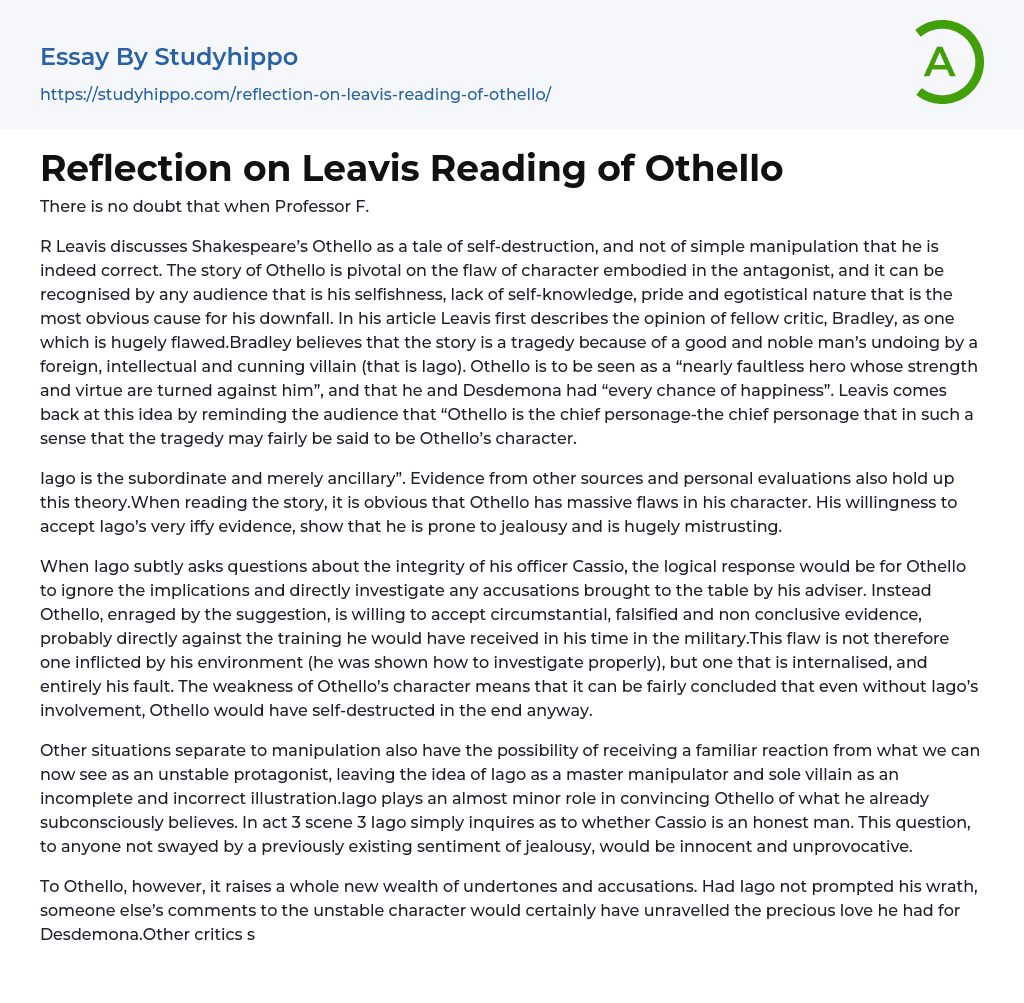Undoubtedly, Professor F's influence is unquestionable.
In his discussion of Shakespeare's Othello, R Leavis asserts that the story is a tale of self-destruction rather than simple manipulation. According to him, Othello's downfall emerges from his inherent flaws of selfishness, lack of self-knowledge, pride, and an egotistical nature. Leavis argues against fellow critic Bradley's perspective that the tragedy is due to a good and noble man's undoing by a foreign, intellectual, and cunning villain (Iago). Bradley describes Othello as a "nearly faultless hero whose strength and virtue are turned against him" and that he and Desdemona had "every chance of happiness." However, Leavis counters Bradley's claim by asserting that Othello is the chief personage of the tragedy because of his character.
It can be inferred from external sources and personal assessments that Iago is subordinate and merely supplementary. This theory is supp
...orted by the evident flaws in Othello's character when reading the story. Othello's inclination to believe Iago's dubious evidence is a clear indication of his susceptibility to jealousy and distrust.
Despite being trained in proper investigation techniques, Othello fails to ignore Iago's insinuations about the integrity of Cassio, his officer. Instead, he allows himself to be irrationally outraged and accepts falsified, circumstantial and inconclusive evidence presented by Iago. This flaw is not a result of his environment but rather an internalized weakness of character that is solely his fault. It can be inferred that even without Iago's manipulations, Othello's self-destructive tendencies would have eventually led to his downfall.
The notion of Iago as the sole villainous mastermind is incomplete and incorrect, as there are other scenarios in which an unstable protagonist may elicit a familiar response. In reality, Iago'
role in persuading Othello is minor, as he merely poses a harmless question in Act 3 Scene 3 regarding Cassio's honesty. This query, if not spurred by pre-existing jealousy, would have been interpreted as innocent and unassuming.
The comments of others, particularly Iago, present new implications and allegations about the character Othello. This causes instability in his emotions which ultimately leads to the downfall of his love for Desdemona. Andrew Prelusky and other literary analysts share this analysis by emphasizing that tragic heroes must experience a shift from good fortune to misfortune, which Othello fails to do due to his inherent flaws. However, Leavis argues that Othello's inability to learn from his tragic downfall contributes to the story's tragedy. Even in his soliloquy directed towards the audience, Othello requests to be remembered as someone who "loved well but not wisely" and was not inclined towards jealousy.
Although Othello declares his ability to love fully and completely, his behavior in the narrative contradicts this statement as he fails to acknowledge his own imperfections and gives in to jealousy. This indecisiveness and disappointment for readers is heightened by Leavis' claim that Othello's feelings towards Desdemona are uncertain. The uncertainty surrounding the sincerity of Othello's emotions adds further intricacy to the tale.
Leavis posits that Othello did not genuinely love Desdemona but rather used her to fulfill his own desires. Despite appreciating her benevolence and unselfishness, he never truly loved her. Leavis references Othello's final speech bemoaning his mistreatment as evidence that he prioritized his emotions over Desdemona's demise. Although I agree with this depiction of their relationship, I have reservations. Owing to discrimination based on his race, Desdemona's care for
him may have been misconstrued as affection stemming from a desperate longing for love.
Both Leavis and I agree that Othello's relationship with Desdemona declined because of his jealousy and self-destructive behavior. Leavis' analysis aligns with my impartial view on the matter, highlighting these themes in Othello. Furthermore, Andrew Prelusky's independent assessment supports the notion of Othello's tragic downfall, lack of affection towards Desdemona, and unfortunate circumstances.
- Othello Jealousy essays
- Reading Books essays
- 1984 essays
- A Farewell to Arms essays
- A Good Man Is Hard to Find essays
- A Hanging essays
- A Lesson Before Dying essays
- A Long Way Gone essays
- A Rose For Emily essays
- A Separate Peace essays
- A Tale Of Two Cities essays
- A Very Old Man With Enormous Wings essays
- Adventures Of Huckleberry Finn essays
- Alice in Wonderland essays
- All Quiet on The Western Front essays
- Allegory of the Cave essays
- An occurrence at owl creek bridge essays
- Animal Farm essays
- Anthem essays
- Antigone essays
- Arthur Conan Doyle essays
- As I Lay Dying essays
- Atticus Finch essays
- Barn Burning essays
- Battle Royal essays
- Beauty and The Beast essays
- Beloved essays
- Boo Radley essays
- Brave New World essays
- Candide essays
- Castle essays
- Characters In Hamlet essays
- Characters In Romeo And Juliet essays
- Christmas carol essays
- Chronicle of a Death Foretold essays
- Cinderella essays
- Crime and Punishment essays
- Daisy Miller essays
- Death of a Salesman American Dream essays
- Desdemona essays
- Diary Of A Wimpy Kid essays
- Dracula essays
- Dubliners essays
- Emma essays
- Ender'S Game essays
- Ethan Frome essays
- Eveline essays
- Fahrenheit 451 essays
- First-Person Narrative essays
- Fish Cheeks essays




